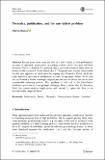Normalcy, justification, and the easy-defeat problem
Abstract
Recent years have seen the rise of a new family of non-probabilistic accounts of epistemic justification. According to these views—we may call them Normalcy Views—a belief in P is justified only if, given the evidence, there exists no normal world in which S falsely beliefs that P. This paper aims to raise some trouble for this new approach to justification by arguing that Normalcy Views, while initially attractive, give rise to problematic accounts of epistemic defeat. As we will see, on Normalcy Views seemingly insignificant pieces of evidence turn out to have considerable defeating powers. This problem—I will call it the Easy-Defeat Problem—gives rise to a two-pronged challenge. First, it shows that the Normalcy View has counterintuitive implications and, second, it opens the door to an uncomfortable skeptical threat.
Citation
Backes , M 2018 , ' Normalcy, justification, and the easy-defeat problem ' , Philosophical Studies , vol. First Online . https://doi.org/10.1007/s11098-018-1155-y
Publication
Philosophical Studies
Status
Peer reviewed
ISSN
0031-8116Type
Journal article
Rights
© The Author(s) 2018. Open Access. This article is distributed under the terms of the Creative Commons Attribution 4.0 International License (http://creativecommons.org/licenses/by/4.0/), which permits unrestricted use, distribution, and reproduction in any medium, provided you give appropriate credit to the original author(s) and the source, provide a link to the Creative Commons license, and indicate if changes were made.
Collections
Items in the St Andrews Research Repository are protected by copyright, with all rights reserved, unless otherwise indicated.

